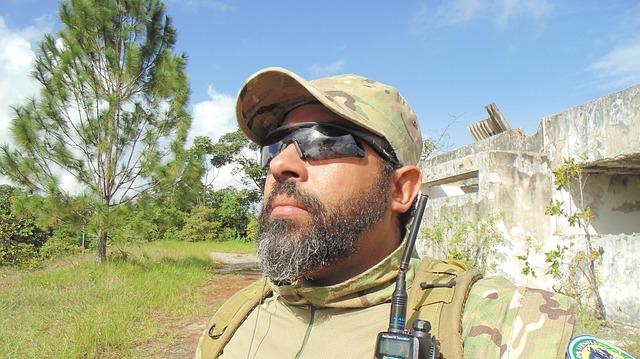On the eve of Thanksgiving, U.S. Africa Command (AFRICOM) Commander General Michael langley made a notable visit to Djibouti, underscoring the strategic importance of the region in American military operations on the continent. This visit highlights the ongoing commitment of the United States to strengthen partnerships and enhance security cooperation in east africa. As American troops and personnel stationed at Camp Lemonnier prepare to celebrate the holiday away from home, General Langley’s presence serves not only as a morale booster but also as a reminder of the vital role Djibouti plays in U.S. military strategy,particularly in counterterrorism efforts and humanitarian missions. This article delves into the implications of the visit, the rapport with Djiboutian leadership, and the broader context of AFRICOM’s mission in Africa.
AFRICOM Commander’s Diplomatic Mission in Djibouti During Thanksgiving
In a significant display of commitment to regional stability and partnership, the AFRICOM Commander visited Djibouti during the Thanksgiving season. This diplomatic mission underscored the importance of fostering relationships with local leaders and strengthening military collaboration. Meeting with dignitaries, the Commander emphasized shared values and mutual interests, focusing on cooperation in areas such as counterterrorism, humanitarian assistance, and security sector reform. The visit also included engaging discussions on the ongoing initiatives aimed at enhancing operational capabilities among African nations.
The event served not only as a formal engagement but also as an prospect to express gratitude. To mark the occasion, the Commander participated in a community outreach program, which featured:
- Community dinners that brought together service members and local families.
- food drives aimed at supporting those in need during the holiday season.
- A cultural exchange showcasing traditional Djiboutian art and music.
This mission exemplified a commitment to not just military alliances but also to human connections, reinforcing a message of solidarity and recognition during the holiday season.

Strengthening Military Partnerships for Regional Stability
The visit of the AFRICOM Commander to Djibouti not only marked a celebration of Thanksgiving but also served as a crucial platform for discussing the importance of military collaboration in the region. Djibouti, strategically located at the crossroads of international shipping lanes, remains a vital partner in promoting security and stability in the Horn of Africa. During the visit, both military leaderships emphasized initiatives designed to enhance interoperability and operational readiness among regional forces. Key highlights of the discussions included:
- Joint Training Exercises: Plans for future joint operations to enhance tactical efficiency.
- Intelligence Sharing: Strategies to foster real-time intelligence exchange between nations.
- Humanitarian Assistance Coordination: Strengthening responses to natural disasters and human crises in the region.
This engagement serves to reinforce ongoing efforts to develop a more cohesive regional defense strategy, focused on countering terrorism, piracy, and other transnational threats.The collaborative exercises and missions may involve a diverse array of partners,ensuring a united front against destabilizing forces. A brief overview of current partnerships and future initiatives was highlighted:
| Partner Nation | Military Initiative | Impact Area |
|---|---|---|
| Somalia | capacity Building | Counterterrorism |
| Ethiopia | Joint Maneuvers | Border security |
| Kenya | Logistics Support | Humanitarian aid |

Addressing Humanitarian Needs: AFRICOM’s Role in Djibouti
The strategic partnership between AFRICOM and Djibouti plays a vital role in addressing humanitarian needs in the region. Recent visits by the AFRICOM Commander have underscored the importance of cooperation in providing assistance to vulnerable populations. through joint efforts, various initiatives are being implemented to ensure access to essential services and support.Key areas of focus include:
- Medical Assistance: coordinating medical missions to reach remote communities.
- Food Security: Assisting in the distribution of essential food supplies.
- disaster Response: Enhancing preparedness and response capabilities for natural disasters.
- Training and Support: Collaborating with local organizations to bolster their relief efforts.
In an effort to quantify their impact, AFRICOM has developed metrics to track the progress of their humanitarian initiatives. The following table outlines some of the key achievements over the past year:
| Initiative | Beneficiaries | Impact |
|---|---|---|
| Medical Missions | 5,000+ | Improved health outcomes |
| Food Distribution | 10,000+ | Reduced malnutrition rates |
| Disaster Preparedness Training | 300+ | Enhanced community resilience |
The Significance of Djibouti in U.S. Strategic Interests
Djibouti holds a pivotal role in enhancing U.S. strategic interests in the Horn of Africa and beyond, serving as a key operational hub for military and diplomatic engagements. Its geographic location, perched at the mouth of the Red Sea, provides unparalleled access to maritime trade routes and facilitates the movement of naval forces to key areas of interest. This strategic positioning allows the U.S. to bolster regional security initiatives, counter-terrorism efforts, and humanitarian responses. The presence of several military installations, including Camp Lemonnier, further signifies Djibouti’s importance, enabling rapid deployment and sustained operations in a region plagued by instability.
Beyond its military significance, Djibouti is crucial for fostering partnerships with neighboring countries and international organizations. The U.S. engages in various collaborative endeavors aimed at addressing pressing issues such as piracy, human trafficking, and regional conflicts. The benefits of these partnerships extend to both the U.S. and Djibouti, fostering economic progress and stability. Key aspects of U.S. interests in Djibouti include:
- Counter-Terrorism operations: Targeting extremist groups threatening regional and global security.
- Humanitarian Aid Coordination: Facilitating efforts during crises and disasters in the region.
- Intelligence Sharing: Enhancing situational awareness through collaboration with local authorities.
Considering these factors, Djibouti’s role as a linchpin in U.S. operations cannot be overstated. The ongoing commitment to strengthen ties with Djibouti reaffirms the broader U.S. strategy of engagement in Africa, with hopes of creating a more stable and secure surroundings for both regional partners and global stakeholders alike.

Future Recommendations for Enhanced Cooperation and Development
The recent visit to Djibouti by the AFRICOM Commander underscores the importance of fostering stronger ties across nations in the region. To enhance cooperation and development, it is essential to focus on strategic initiatives that address both security and socio-economic challenges. Key recommendations include:
- Establishing joint Training Programs: Facilitate collaborative military exercises that not only build capacity but also foster relationships among African nations.
- Shared Intelligence Networks: Develop a robust information-sharing framework that can assist in combating terrorism and transnational crime.
- Promoting Sustainable Development Projects: Invest in infrastructure and economic initiatives that support both local communities and regional partnerships.
Additionally,continued engagement with local governments and community leaders is imperative for sustained progress.Understanding cultural nuances and addressing specific local needs can pave the way for more effective policy implementations. A collaborative effort can also be enhanced through:
| Focus Area | Action Steps | Expected Outcomes |
|---|---|---|
| Security Cooperation | Joint task forces for threat assessment | Improved regional stability |
| Economic Partnerships | Cross-border trade initiatives | Boosted local economies |
| Community Engagement | Civic education programs | Enhanced public trust and collaboration |

In Conclusion
the recent visit of AFRICOM Commander General Michael Langley to Djibouti during the Thanksgiving holiday underscores the vital strategic significance of the region and the ongoing commitment of U.S. military leadership to engage with local forces and communities. This diplomatic effort not only fosters stronger relationships between the U.S. and Djibouti but also highlights the importance of partnership in addressing shared security challenges across the Horn of Africa. As the host nation plays a critical role in regional stability and counterterrorism initiatives, the presence of U.S. leadership emphasizes a collaborative approach to maintaining peace and security. The visit epitomizes the spirit of thanksgiving by recognizing the bonds formed through mutual respect and cooperation, crucial in navigating the complex geopolitical landscape of the region. As AFRICOM continues to navigate its mission in Africa,such interactions will remain pivotal in reinforcing partnerships that enhance humanitarian efforts and promote enduring stability across the continent.







